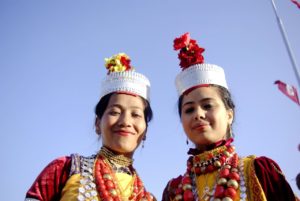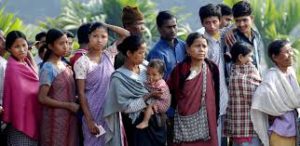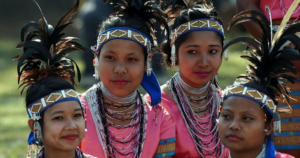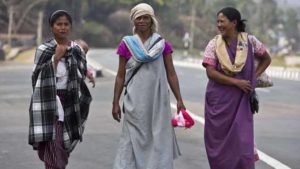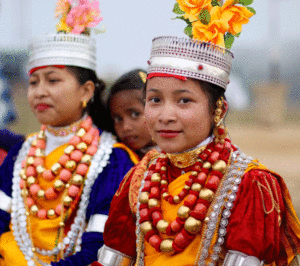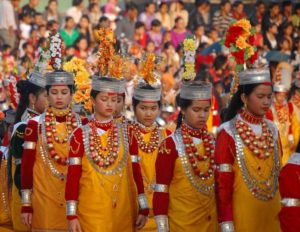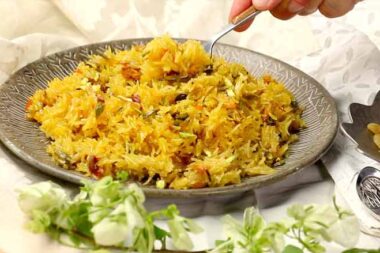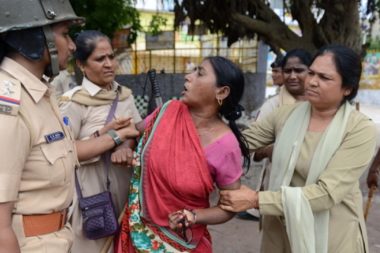In times when there is such savage struggle to establish a truly feminist society, concepts like daughters of the family inheriting all ancestral properties; husbands residing at their mom-in-law’s house post marriage; children inheriting their mother’s surname; the birth of a female child being grandly celebrated; married couples adopting a girl child, if they don’t have any, in order to pass their ancestral property and family lineage; women living an independent life and being never under the societal pressure for getting married; businesses being women-centric; women enjoying and experiencing total security seem to be the affairs of an alternate universe that is supposedly utopian. But, all the aforesaid statements are pieces of truth in the Matrilineal Khasi tribe of Meghalaya, a North Eastern state of India. But, the only surviving matrilineal culture of India is under a serious threat of getting overturned, owing to several socio-political reasons.
Roughly 1.7 million population of the Khasi-Jaintia tribe of Meghalaya constitute a matrilineal system of society where the family name and ancestral property are passed down through the female line of descent. The existence of a matrilineal system in India that makes women the epicentre of a family is quite rare and unheard of in an age where there is so much chatter around the deep-seated dominance of the patriarchal society. It is quite stirring to find that amidst distressful social effects of patriarchy and patriliny, there is a tribe where “no single woman will ever have an illegitimate child…they don’t have to give dowry…women have inheritance rights and are also comparatively free-er than their counterparts in the rest of the country”, says thebetterindia.com very rightly. Khasi women work their mettle, run their own agriculture and silk weaving businesses, make their own money, live at their own spaces and hardly depend on men for their livelihoods. “The Khasi matrilineal society is of the feminine kind emulating masculine forms of leadership are not the way of the Khasi women”, says Naphrisa Tariang, a Khasi writer and student of Literature in Kolkata who happens to be the only woman in her class descending from a matrilineal society. According to popular anthropological research, such an unusual and empowering system has started losing some of its matrilineal traits and is currently heading towards the phase of extinction.
A men’s rights group called Syngkhong Rympei Thymmai (SRT) is a campaigner for equal distribution of ancestral property to both male and female children. Their actual aim has been to nullify matriliny and establish a patriarchal form of society like the rest of the world. They are of the opinion that matriliny has been very detrimental to the condition of men in Khasi society. Men literally have no family onus resting on their shoulders which has stunted their social and individual growth. They are enveloped in a no-responsibility atmosphere and languish due to a lack of belonging-ness either in their parents’ house or in their in-laws’. They suffer from identity crisis and become preys of inferiority complex. The effects of this have been markedly deteriorating where boys drop out of school, wander aimlessly, do drugs , become alcoholics and according to economictimes.indiatimes.com “die by 40”. Khasi men after a point of time fizzle out, go to pieces and waste away. The condition of Khasi men has degraded to such an extent that Khasi women don’t want to tie nuptial knots with them. They go on to marry people outside their communities. This union of Khasi women with non-Khasi men is interfering with the purity of the Khasi tribe which will eventually make the society extinct. Moreover it has been observed that the intentions of non-Khasi men, in such marriages, are mostly driven by financial objectives. Bangladeshi immigrants, for instance, get lured by the income tax exemptions provided to the SRT and therefore take undue advantage of matriliny.
In addition to this, the SRT argues that Khasi men have become irresponsible to the extent of deserting their wives and families, which is why Meghalaya has gone on the records to have 22% single mothers and the highest rate of abandoned women. Thus it is foreseen by many intellectuals that matriliny might lead to the extinction of the community as a whole.
Keeping the aforesaid concerns in view, the Khasi Hills Autonomous District Council (KHADC) has put forth a lineage bill saying “any Khasi woman who marries a non-Khasi as well as her offspring born out of such marriages , shall be deemed a non-Khasi who shall lose Khasi status and all privileges and benefits as a member of the Khasi tribe.” (newsdeeply.com). Such a bill has generated widespread protest amongst Khasi women. They are in utter disagreement with it saying that these are attempts to curtail the freedom of women and establish patriarchy very much like the rest of the country.
Whether the discontent displayed by the Khasi women is justified or not is a bigger question. Many women are of the opinion that matriliny has never been truly empowering. Rather it has just posed a mere illusion of emancipation. Although matriliny appears quite liberating and empowering for women belonging to the rest of the country who have been battling for minimal rights since years, yet it should not be confused with matriarchy where the total power lies in the hands of the women. Khasi women have counter argued that, crucial decisions pertaining to their families and children are mostly made by the father or the maternal uncle who enjoy a good amount of control over the family and society. Furthermore, Khasi women were never a part of local governance and active politics has been male-dominated like any other part of the country.
Amended bills that restrict the marital rights of Khasi women have therefore been viewed in a negative light. Many strong female forces have protested against the KHADC bill and are doing their best bits to save the matrilineal culture and whatever empowerment it begets. For example, Mayfreen Ryntathiang, a Social Worker and a Human Rights activists, encourages the upcoming generation to understand the importance of the deeply ingrained matrilineal norms and how they pump in independence for women.
Another strong female force is Christina Simpson Jyrwa, a Khasi with English origins who encourages the newer generation of Khasis to document and record their own culture so that the world doesn’t completely forget them. She was the one whose Khasi mother had once decided to get separated from her British father just to stay back, hold on to the centuries old roots, continue her family name and the matrilineal system as a whole. According to them, it is due to matriliny that unlike the larger part of India “Khasi women can live an independent life, dress well, attend church, and may prefer not to get married.”
No doubt women have been taking the harder route just for the love of the empowerment that matriliny has endowed on them and also for their deepest desire to witness a society that puts women at its helm. But such unconditional sacrifices are rare and such unmitigated loyalty is few and far between which might lead to the cessation of the matrilineal flow.
We might not exactly predict the future of the Matrilineal Khasi tribe but we can unanimously agree that matriliny has made women the fulcrum of the Khasi society which is quite unusual and inconceivable in contemporary ages. Although not as empowering as matriarchy, yet descent through mother, matrilocal residence system and inheritance of parental property by the daughter are narratives of a society that has made women experience empowerment in close quarters. Any kind of threat to such a system would pose a threat to women empowerment in general and such a picture is surely bleak and gloomy. All an enlightened mind can want for is the establishment of a more balanced society where equilibrium between both the genders is maintained. Probably that would be an ideal space where both Khasi women and men could successfully thrive and grow.
But a more protracted prism would land us on different plateaus!

